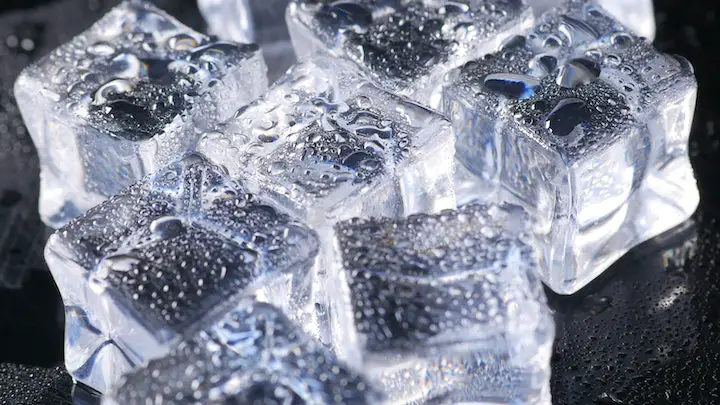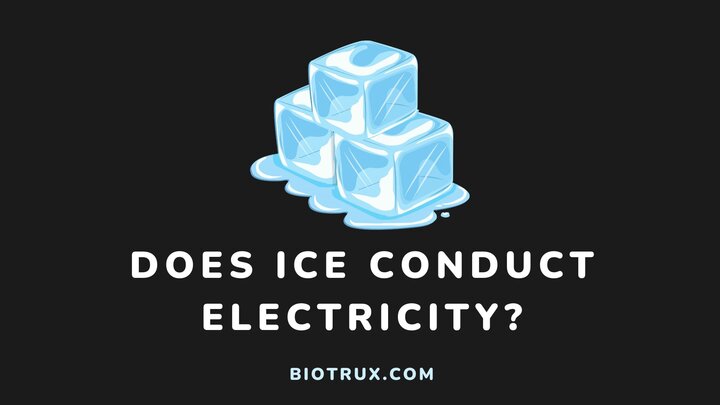Ice, ideally, does not conduct electricity. For any substance to conduct electricity, it must have freely moving electrons or ions. This is because hydrogen bonds restrict the movement of ions in solid matter.
However, there are instances where the conductivity of ice can be accelerated. This usually occurs in frozen tap water or rainwater. This form of water gives little room for the movement of ions and will slightly conduct electricity.
In this guide, I will explain why ice is a poor conductor of electricity, why and what makes ice made of tap and rainwater conduct, and what solid matter offers in terms of electrical conductivity and resistivity.
But first, let us begin with ice’s physical and chemical properties.
Properties of Ice
- Ice is a solid crystalline substance that binds water molecules with hydrogen bonds.
- It is translucent as it does not allow the direct passage of light through.
- In terms of density, ice is denser than liquid water. This is why it floats in water.
- When liquid water freezes and becomes ice, its overall volume increases.
- The melting and freezing point of ice is 32°F.
Is Ice a Good Conductor of Electricity?

Ice is frozen water. Pure or distilled water contains H+ and OH– ions that are extremely negligible. This concentration of ion is low and ideally will not conduct electricity.
A similar principle applies to ice made from pure water (pure ice). Its molecules enjoy high intermolecular attraction thanks to their rigidity and hydrogen bond.
Hence, the movement of ions in ice is extremely low and will not conduct electricity.
When is Ice Conductive?
Like water, ice can be made to conduct electricity in the presence of an electrolyte or impurity. When an electrolyte such as table salt (NaCl) dissolves in water, it dissociates into sodium hydroxide (NaOH), hydrogen, and chlorine gasses.
This allows for slight movement and conduction of these ions. When impurities such as hydrochloric acid (HCL) are present in water, it also benefits from conduction. This is due to the solution dissolving into H3O+ and Cl–.
Hence, frozen water or ice containing impurities or minerals, such as tap water or rainwater, can conduct electricity. However, its electrical conductivity will not be as powerful as water (in its liquid state) because water is way denser.
Another factor that can make ice or water conduct is voltage frequency. If a very high voltage runs through water or ice, it will readily conduct electricity.
Electrical Conductivity and Resistivity of Ice
The electrical conductivity of pure ice is <10-9 S/m. This is very low and proves it is a poor conductor of electricity. However, impurities will increase this value and make ice conduct electricity better than solid insulators like dry rock or regolith.
Regarding resistivity, ice has a strong resistance, irrespective of electrolytes or impurities. The resistivity of ice is about 0.4 to 2.0 x 105 at -2 and -29°C.
Does Ice Conduct Heat?
Ice is a non-metallic crystalline solid with significant hydrogen bonds within water molecules. This implies less mobility or vibration, hence, ice is a bad conductor of heat.
The thermal conductivity range of ice at -29 °C using CAS air-blast freezing methods is approximately 2.75 ± 0.03 W/(m.K.). This means the presence of AMF does not affect the thermal conductivity of freezing water.
Is snow a conductor of electricity?
Snow sometimes gets confused with ice, but they are not the same. The difference between snow and ice is air-related density. To put it another way, snow is frozen atmospheric vapor, whereas ice is frozen water.
Snow is not as dense as water due to the amount of air trapped in its crystals. Air is naturally a poor conductor of electricity, hence, snow is ideally a poor conductor or an insulator.
FAQs
Can ice create lightning?
Ice can create lightning due to the attraction of opposing charges that occur within a cloudy storm.
Positively charged ice particles accumulate in the upper part of the storm while the negative particles occupy the middle and lower portions.
Can electrical energy melt ice?
Electrical energy can melt ice, but the reaction is not a direct one.
This is because electrical energy must first transform into heat energy for melting.
Can gasoline become ice?
Gasoline is a mixture of various chemicals and will never become ice.
The highest solid state that gasoline can assume is to become syrupy, which will occur at a freezing temperature of about -50°C.
Conclusion
Ice is naturally a poor conductor of electricity and heat, with or without external factors (electrolytes or impurities). This is because it has low ion concentration and movement.
On the other hand, water will conduct electricity and heat when it contains impurities or electrolytes. This occurs as a result of ionic dissociation.
I hope you found this guide helpful. To better understand the relationship between water and electrical conductivity, please see if pure water conducts electricity.
Thanks for reading.

